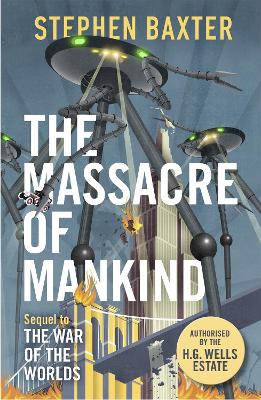Reviewed by Quirky Cat on
Baxter is back again with another sequel from H.G. Wells (his other one being a follow up to the Time Machine). Many fans were split on how they felt about this. Some loved it, some less so. Regardless of whether or not you enjoyed it, I would like to point out just how much effort Baxter put into researching the previous work and all the notes that went along with it.
If you’re reading this review, you’ve probably read War of the Worlds as well. Or at least are ok with getting spoilers about it (or so I should hope). The Massacre of Mankind is written much like War of the Worlds, in the style of a surviving writing a novel about what they experienced.
In this novel, the perspective switches to a side character from the original; Julia Elphinstone. As before, it’s clear right from the start that humanity survived the attacks from other worlds (because how else would somebody be writing the story?). The how and why humanity survived is less obvious; clerly we’re meant to finish the book to understand that part (which makes sense). Even this simple choice is an ideal hat-tip towards H.G. Wells’ story. History is heavily altered, similar to the way it was in War of the Worlds, to fit the narrative and invasion to the timeline desired.
I mentioned above that I felt that Baxter had done extensive research and note taking for this book. Unfortunately I also felt that this fact got in his way. There were times where I felt that facts were being thrown at me, simply to prove that they were known. It disrupted the flow and ultimately kept me from immersing myself in the novel in the way I would have preferred. I also felt that there was much more name throwing this time around than beforehand. I’m unsure if this was an intentional change, or yet another symptom of trying to prove what facts were known.
The other factor I found jarring was the nitpicking of many characters against the book written by Walter Jenkins (and thus the War of the Worlds we’ve all read). It felt like this was the author’s way of picking away at H.G. Wells’ writing. Perhaps I am misinterpreting the intent here, but that is still how it came off to me. Which I found to be odd; considering one would assume he had great love and respect for both War of the Worlds and H.G. Wells.
All in all I found this to be a very respectable attempt at a follow up to War of the Worlds. I was hoping to enjoy it more than I did, but on the bright side I never found myself angered or upset by it either (which is significantly better than some series fare when another author takes over).
For more reviews, check out Quirky Cat's Fat Stacks
Reading updates
- Started reading
- 29 August, 2017: Finished reading
- 29 August, 2017: Reviewed
